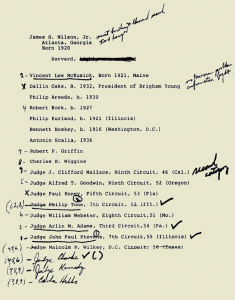 This afternoon, I participated in a debate with Rick Esenberg at the Marquette University Law School. The debate was co-sponsored by the American Constitution Society and the Federalist Society. I was asked to defend the constitutionality of the individual mandate imposed by the Affordable Care Act. What follows are my prepared remarks.
This afternoon, I participated in a debate with Rick Esenberg at the Marquette University Law School. The debate was co-sponsored by the American Constitution Society and the Federalist Society. I was asked to defend the constitutionality of the individual mandate imposed by the Affordable Care Act. What follows are my prepared remarks.
Historians tell us that the connection between access to health insurance and employment was an accident. During World War II, wage and price controls prevented employers from increasing cash compensation for their workers. Employers wishing to recruit workers began to offer subsidized health insurance benefits as a way of avoiding this freeze on wages.
This is not a gift to workers from employers. We all pay for our health insurance with our labor. In return for our labor, we receive a combination of cash, employer provided benefits and non-cash prerequisites. The amount that employers pay towards our health insurance premiums is part of our income, which is why we are taxed on our employer-provided insurance above a certain level. The government encourages employers to offer health insurance benefits by allowing the employer to deduct these expenses as a business expense. About 60% of us receive health insurance through our employer.
The elderly and the disabled are not physically capable of working. Employer-based health insurance does not work for them. They receive their health insurance through Medicare. Participants pay certain deductibles and co-payments, but the bulk of the cost is imposed on the rest of us in the form of a payroll tax and the government then pays medical providers.
So our health insurance system has become tied to employment. As the costs of health care rise, it is increasingly difficult for middle and lower income Americans to afford health insurance unless they get it through an employer. This is because, as I mentioned, an employer will partially subsidize the cost of the premium as a component of total compensation. In addition, an employer can offer access to a plan that includes many other workers, thus broadening the risk pool and lowering the overall premium for each worker. An individual who seeks to purchase health insurance on their own gets neither of these two advantages. As health care costs continue to rise (an annual increase of about 8% in recent years), this cost differential becomes more significant.

